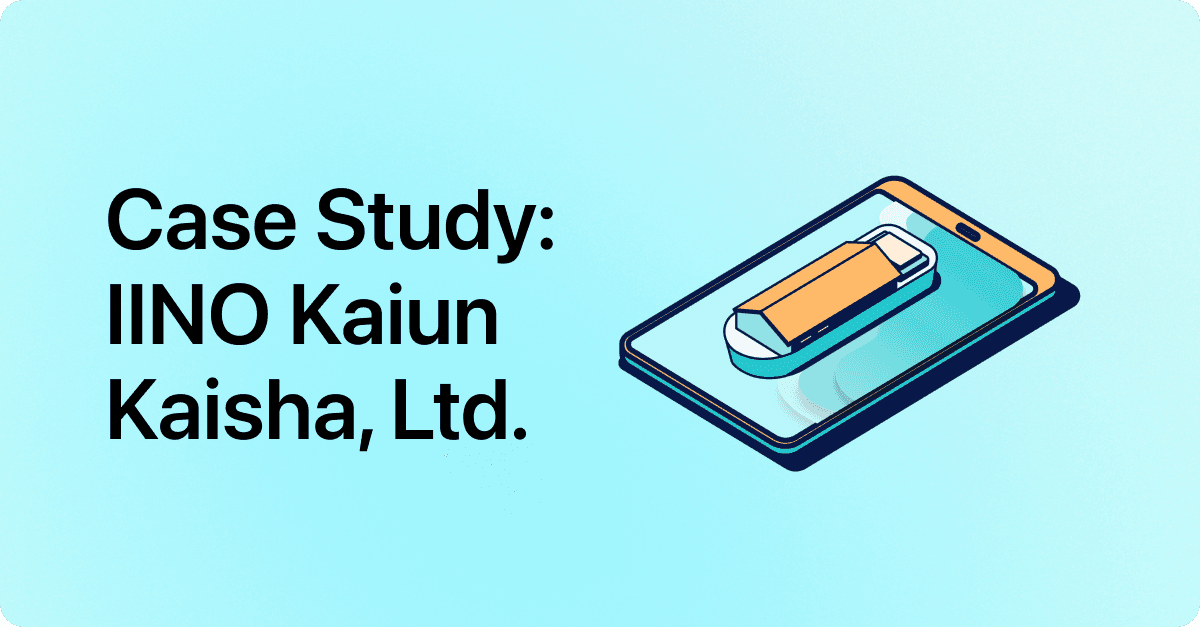Case Study: IINO Kaiun Kaisha, Ltd.

The International Maritime Organization (IMO) implemented strict carbon emission regulations for the global fleet starting January 2023, requiring the maritime shipping industry to pivot operations to meet the new requirements of the Carbon Intensity Indicator (CII) grading system.
Sustainability is a core objective at IINO Kaiun Kaisha, Ltd., and achieving a passing CII grade is a top priority for the company. However, keeping track of the emissions of 65+ vessels across the global fleet is no easy feat.
The Problem
Many shipping vessels use physics-based emissions tracking models to measure their carbon impact. However, these models are limited and cannot factor in many voyage variables like fouling, weather, etc. — meaning physics-based models can only provide around 80% accuracy.
When tracking CII, inaccurate emissions prediction can mean the difference between a passing and a failing grade.
With a fleet as large as IINO’s, inaccurate predictions could risk millions of the company’s bottom line.
The Solution
IINO partnered with Bearing AI to use its AI-powered CII solution on IINO’s international vessels. BearingAI’s solution can calculate CII prediction and provide prescriptive recommendations for securing a passing CII grade with industry-leading accuracy, using only a vessel’s noon reports.
IINO collaborated with Bearing AI on the development of this tool by feeding ship operation and management expertise into Bearing AI’s performance model. The model has been trained on thousands of voyages to date, allowing the prediction of metrics like fuel consumption with more accuracy than the conventional models in the industry today.
“Bearing AI carefully listened to the voice of our marine professionals and developed this practical CII Optimization tool in a very agile and timely manner. It will help us to identify which vessels need attention with ample time for actions to improve their scores. This intelligence will play an important role as we adjust to the new regulatory requirements and execute our plans to reduce emissions across our fleet.”
Ryuichi Osonone, Director / Senior Managing Executive Officer at IINO Lines.
Bearing AI's models are significantly more accurate than physics-based models, with an accuracy of around 90% - 95% on average using noon report data alone. Bearing AI models that are trained using sensor data from a ship can reach an accuracy of above 98%. Using Bearing AI’s solution, IINO can predict its CII scores with confidence.
Bearing AI’s solution doesn’t stop at score predictions — it can also provide prescriptive recommendations, allowing vessels to visualize what actions they need to take to receive passing CII scores, empowering informed decision-making.
Bearing AI’s CII Solution
Optimizing with Bearing AI’s CII product, shipping companies can:
- Easily track and monitor real-time CII ratings for all vessels throughout the year and flag ships that may potentially have problematic ratings
- Accurately forecast a ship’s end-of-year CII rating based on historical routing and weather patterns
- Quickly and easily implement on one ship or an entire fleet, no sensors, training, or installation needed.
- Simulate how different operating conditions (e.g., different speeds), seaway conditions, and weather scenarios will impact CII ratings
- See the tradeoff between financial returns and potential CII ratings
- Maintain fleets with marketplace competitive advantages
“We’re all about helping shipping companies make smarter, more data-driven strategic decisions. These companies know the new CII regulation will affect their business, but they have no way to assess its impact on a ship-by-ship basis accurately. We do, by combining our best-in-class AI models with data from around the world. With our CII Optimization product, shippers can see what we see and take the steps they need to reduce their environmental impact while improving their bottom line.”
Dylan Keil, Bearing AI Founder and CEO
More Articles
Stay Connected
Subscribe to The Noon Report for the latest news
on what's driving the maritime shipping industry


 Back To Blog
Back To Blog